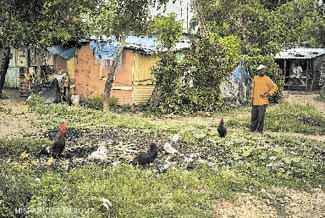
EDUCATION OF YOUNG PEOPLE AND SUPERVISION OF ELDERS By Léo Joseph
- AFD-Ron Barceló and the economic and social development of the Bateyes communities
On 18 July 2018, a ceremony was held at the Campo Azul Club in the municipality of Ramòn Santana, in the province of San Pedro de Macoris, during which the children of the bateyes, mainly of Haitian origin, were recognized for their academic success, in addition to receiving prizes. A similar event took place on July 12, 2019, at the UC campus auditorium in San Pedro de Macoris. The last two in a series that began several years ago, these phenomena are part of the programmes set up by “Fundación Alcoholes Finos Dominicagos-Ron Barceló” pool their resources to change the fate of the people from the bateyes and disadvantaged communities in the Dominican Republic.
In both the 2018 and the July 2019, events and those before, prizes were awarded to the best performing students from more than 20 bateyes in the San Pedro de Macoris jurisdiction in the presence of Bianca Iraida Velazco de Galindez, Executive Director of the AFD-Ron Barceló Foundation, and other officials from this institution. In addition were present, at the 2019 version of the award ceremony offered by AFD-Fundación Ron Barceló, Lawyer Bolivar Sosa Sariano, Regional Director of Education 05, as well as other leaders of the San Pedro de Macoris education system. Not to forget members of the Foundation’s Executive Board. As well as Jean-Claude Valbrun, President of Hispaniola Debout, the organization that created the Jacques Viau Clinic, near Batey Consuelito, in the municipality of Consuela, also in the province of San Pedro de Macoris.
Speaking at this past July 12 ceremony, as was also the case in 2018 and before, Mrs. Velazco de Galindez warmly congratulated these children, promising that the AFD-Ron Barceló Foundation would support them in their studies, as long as their academic success remained consistent. In the presence of parents and some teachers, in addition to other personalities from the world of education, the latter, who can rightly be considered as the driving force behind the Foundation’s humanitarian work, reiterated to this new batch of students the promises that had been made earlier to their honored predecessors in the past. Needless to say that she considers their academic success as a reward for her efforts, if not a personal victory.
Solemn promises to disadvantaged children
Not only are students from bateyes and disadvantaged neighborhoods, who have excelled at school, got congratulated by AFD-Ron Barceló Foundation officials, in addition to receiving gifts from them, they have heard the same promises that had been made to previous promotions. On behalf of the Foundation, the leaders solemnly repeated assurances made earlier since the beginning of the “On the Road to Success” program, to hundreds of schoolchildren from the bateyes or from other less fortunate families. It should be reminded, by the way, that “On the Road to Success” is the slogan driving this school program on which is pinned the change of life and social status of many. Men and women who, left on their own have no chance of leaving their mark on the society in which they live.
The Foundation’s commitments to these social categories are expressed in the following terms: The education of students, who stand out for their academic performance, will almost certainly be provided by this non-profit entity. Their parents will not have to worry about school fees or transportation and uniform costs, etc. Those who manage to obtain a university degree are guaranteed a job in the factory.
In that context, AFD-Ron Barceló is taking action and hiring several young Haitians born in the bateyes. This is the case, for example, of Hendrix Eusebio, who works in the tourism projects department, one of whose responsibilities is to accompany visitors on tour of the facilities, showing them different phases of rum production, informing them of the various grades of rum distilled and the main countries importing this product. In a recent interview with Haiti-Observateur, Mr. Eusebio identified the main importing countries of Barceló rum as the Dominican Republic (of course,) and then Spain, Chile and the United States of America, to name a few. Still showing the plant around, Hendrix Eusebio showed the different phases of the distillation process, in particular the giant barrels where the ageing of the alcohol produced by the sister company, Alcoholes Finos Dominicanos (AFD) is taking place. Mr. Eusebio pointed out that AFD transforms 60% of the sugar cane harvested into alcohol for the Barceló factory, which produces rum.
Another young Haitian born in a batey, who stands out among the staff of the Barceló factory, is the assistant to the company’s executive director, Ms. Bianca Iraida Velazco de Galindez. No doubt, he plays an important role in the Foundation’s social initiatives, encouraged by his boss who strongly expresses her devotion to the cause of the underprivileged.
Bianca Iraida Velazco de Galindez discusses the genesis of AFD-Ron Barceló’s humanitarian policy
Because of the policy deemed discriminatory of the Dominican Republic towards Haitians residing illegally on its territory, the economic and social assistance programme put in place by the AFD-Ron Barceló Foundation is met with skepticism, at least by the vast majority of Haitians. In the press in general, as well as in the social media, incidents of ill-treatment of Haitian immigrants by the Dominican authorities are routinely reported, including “massive discrimination” by the Dominican military in the form of ill-considerate separation of families. Too often there are reports of raids in which husbands are separated from their wives, and from their children. Immigrant rights organizations, such as GAR, often denounce cases of young Haitians born in the Dominican Republic who are picked up by the authorities to be deported, without any consideration to Haiti, a country they do not know, in addition to having no one to receive them.
Such incidents have, over the years, led to animosity towards Dominican authorities among Haitians, both those living at home and in foreign-based communities. This is understandable when events concerning Haitians in the neighboring State focus almost exclusively on facts that are negative for them. For example, the Dominican press is most often rich in reports of groups of Haitian nationals or citizens of Haitian origin humiliated by the authorities before being deported to the western side of the island; or cases of lynching Haitians for alleged offences; when it is not their human rights being violated by private citizens or police/military authorities.
Obviously, the visit of the Director of Haiti-Observateur (H-O) to San Pedro de Macoris, as part of activities related to the construction, inauguration and subsequent operation of Clinique Jacques Viau, allowed him to have a different perspective on the reality facing cane cutters and their families. The speech delivered by the Executive Director of the AFD-Ron Barceló Foundation and the humanitarian program developed by the Foundation for the children of the bateyes and poor families in general, therefore, piqued Léo Joseph’s curiosity to the point of wanting to obtain objective information, for the benefit of the newspaper’s readers, about the Foundation’s policy. Because it seems to be heading in a completely different direction from what the whole world is learning through what is conveyed in the press.
Indeed, the interview given to the Director of H-O by Mrs. Velazco de Galindez gives the opportunity to measure fully the assistance offered by the Foundation in all its dimensions as well as its potential impact on the targeted communities. In the next edition, readers will have the opportunity to read the revelations of the Executive Director’s Foundation about changing the lives of families relegated to the bottom of the economic and social ladder in the Dominican Republic.
Special collaboration Réseau HEM US/Haïti-Observateur. This article is published by the weekly newspaper Haïti-Observateur, edition of August 21, 2019 Vol. XXXXIX no.32/33, and will be found at P.4 , : http://haiti-observateur.info/wp-content/uploads/2019/08/H-O-21-aout-2119.pdf





